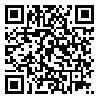Volume 17, Issue 3 (11-2018)
jhosp 2018, 17(3): 21-30 |
Back to browse issues page
Download citation:
BibTeX | RIS | EndNote | Medlars | ProCite | Reference Manager | RefWorks
Send citation to:



BibTeX | RIS | EndNote | Medlars | ProCite | Reference Manager | RefWorks
Send citation to:
Afshani M, Vahdati H, Hakak M, Moosavi S N. Assessing the Relation between Personality Traits with Intention to Whistleblowing. jhosp 2018; 17 (3) :21-30
URL: http://jhosp.tums.ac.ir/article-1-5986-en.html
URL: http://jhosp.tums.ac.ir/article-1-5986-en.html
1- Ph.D. Student of Organizational Behavior Management, Faculty of Administrative and Economic Sciences, Lorestan University. Khorramabad, Iran
2- Assistant Professor, Management Department, Faculty of Administrative and Economic Sciences, Lorestan University, Khorramabad, Iran. (*Correspondent author), Email: vahdati.h@lu.ac.ir
3- Associate Professor, Management Department, Faculty of Administrative and Economic Sciences, Lorestan University, Khorramabad, Iran
4- Assistant Professor, Management Department, Faculty of Administrative and Economic Sciences, Lorestan University, Khorramabad, Iran
2- Assistant Professor, Management Department, Faculty of Administrative and Economic Sciences, Lorestan University, Khorramabad, Iran. (*Correspondent author), Email: vahdati.h@lu.ac.ir
3- Associate Professor, Management Department, Faculty of Administrative and Economic Sciences, Lorestan University, Khorramabad, Iran
4- Assistant Professor, Management Department, Faculty of Administrative and Economic Sciences, Lorestan University, Khorramabad, Iran
Abstract: (4979 Views)
Background: Whistleblowing as a control tool should be encouraged in organizations to deter organizational illegal and immoral wrongdoings that finally are harmful to the society. Personality traits of people are influential factors on their intention to disclose the wrongdoings. This study aimed to assess the relationship between four personality traits (internal locus of control, ethical identity, extroversion and responsibility) and employees' intention to whistleblowing among the employees of central department of Mashhad University of Medical Sciences.
Materials and Methods: This cross-sectional study is a descriptive-analytic one. This research conducted on 251 employees of the central department of Mashhad University of Medical Sciences. A researcher-made questionnaire based on previous literature used to collect the data. Analysis of the data processed using the Partial Least Square (PLS) with Smart PLS software.
Results: Since, the amount of standardized coefficients between independent variables (locus of control, ethical identity, extroversion and responsibility) and whistleblowing intention were statistically significant (P<0.005), all of these independent variables have positive and significant influence on the employees' whistleblowing intention.
Conclusion: Given that individuals with internal locus of control, ethical identity, responsibility and extroversion characteristics cannot be able to ignore the organizational wrongdoings, it is better organizations use employees with these characteristics at more sensitive or critical places, where the possibility of organizational wrongdoing is high, in order to prevent potential harm to the organization and society as a result of wrongdoings.
Materials and Methods: This cross-sectional study is a descriptive-analytic one. This research conducted on 251 employees of the central department of Mashhad University of Medical Sciences. A researcher-made questionnaire based on previous literature used to collect the data. Analysis of the data processed using the Partial Least Square (PLS) with Smart PLS software.
Results: Since, the amount of standardized coefficients between independent variables (locus of control, ethical identity, extroversion and responsibility) and whistleblowing intention were statistically significant (P<0.005), all of these independent variables have positive and significant influence on the employees' whistleblowing intention.
Conclusion: Given that individuals with internal locus of control, ethical identity, responsibility and extroversion characteristics cannot be able to ignore the organizational wrongdoings, it is better organizations use employees with these characteristics at more sensitive or critical places, where the possibility of organizational wrongdoing is high, in order to prevent potential harm to the organization and society as a result of wrongdoings.
Type of Study: Original Article |
Subject:
مدیریت منابع انسانی در بیمارستان
Received: 2018/04/22 | Accepted: 2018/09/3 | Published: 2018/11/10
Received: 2018/04/22 | Accepted: 2018/09/3 | Published: 2018/11/10
| Rights and permissions | |
 |
This work is licensed under a Creative Commons Attribution-NonCommercial 4.0 International License. |





